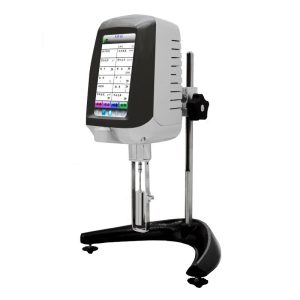沥青流变性能的影响因素
沥青的流变性能是指沥青在不同温度和剪应力下的变形特征. Measuring the rheological properties of asphalt is very important for pavement design and construction. By measuring the viscosity, 弹性模量, rheological index and other parameters of asphalt, we can understand the deformation behavior and flow performance of asphalt under different temperature and load conditions. This data can help engineers select the appropriate asphalt type and formulation to ensure that the pavement has good deformation resistance, 耐用性, and parking ride comfort. 此外, measuring the rheological properties of asphalt also helps to evaluate the effect of additives, optimize the performance of pavement materials, and ensure the safety and reliability of roads.
Influencing factors
There are many factors that affect the rheological properties of asphalt. The following are some of the main influencing factors:
温度:
Temperature is one of the most important factors affecting the rheological properties of asphalt. As the temperature increases, the viscosity of asphalt will decrease and the fluidity will increase. At lower temperatures, bitumen has higher viscosity and poor fluidity, while at higher temperatures, bitumen has lower viscosity and better fluidity.
Shear rate:
Shear rate refers to the rate of shear stress applied to asphalt. The change of shear rate will affect the viscosity and fluidity of asphalt. 一般来说, higher shear rates lead to an increase in bitumen viscosity, while lower shear rates lead to a decrease in bitumen viscosity.
Additives:
Additives can change the rheological properties of asphalt. 例如, polymer additives can increase the elastic modulus and shear strength of asphalt and improve its durability. 然而, the modifier can change the temperature sensitivity of asphalt so that it can maintain appropriate rheological properties over a wider range of temperatures.
沥青流变性能的影响因素
Composition of asphalt:
The composition of asphalt can also affect its rheological properties. Bitumen from different sources and processing methods has different chemical composition and molecular structure, which leads to different rheological properties. 例如, bitumen with a higher content of aromatics usually has a higher viscosity and a lower fluidity.
Load load:
The load of asphalt in practical application will also affect its rheological properties. The high stress and deformation will lead to the change of deformation behavior of asphalt, thus affecting its rheological properties.
These factors interact and jointly determine the rheological properties of asphalt. In engineering practice, it is necessary to select the appropriate type of asphalt and additives according to the specific requirements and application environment to achieve the desired rheological properties.

沥青流变性能的影响因素
如何检测?
Rheometer is one of the commonly used instruments for measuring the rheological properties of asphalt. The rheometer can provide more comprehensive rheological data and can simulate the behavior of asphalt under different strain rates.
The rheometer works by applying a constant shear stress or deformation rate and then measuring the stress response and deformation characteristics of asphalt. By varying the shear stress or deformation rate, the stress-strain relationship of asphalt can be obtained, so as to evaluate its rheological parameters such as viscosity, elastic modulus and rheological index.
When using a rheometer to measure the rheological properties of asphalt, the following steps are usually required:
样品制备: Obtain representative samples from asphalt mixture, and prepare and adjust the samples according to the requirements of the instrument.
Set experimental conditions: set test temperature, strain rate and other experimental conditions as required.
沥青流变性能的影响因素
Conduct the test: Place the sample in the rheometer and select the appropriate test mode and parameters according to the instrument’s operating guide. A rheometer applies a constant shear stress or deformation rate and measures the stress response and deformation characteristics of the asphalt.
Record data: Record the measured stress-strain data, and process and analyze the data as needed.
The rheometer usually provides a variety of test modes and parameters, and different test methods can be selected according to specific requirements. 同时, different rheometers may have different operation procedures and setting methods, so the test should be carried out according to the instructions of the specific instrument. The use of rheometers can provide more detailed and comprehensive data on the rheological properties of asphalt and is therefore widely adopted in research and engineering applications.
